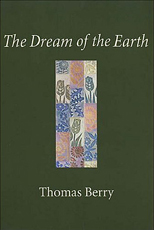This classic eco-theological work was first published in 1988. Thomas Berry, one of the leading environmental thinkers in North America, presents a vision based on courtesy and empathy for the earth and all living things. Berry celebrates the human-earth relations pioneered by Native Americans and calls for further steps in the healing of the planet. He believes that churches and universities have a role to play in helping people to see the earth as a living organism and to link evolution and ethics. This can serve as a counterpoint to the "technological trance" that has resulted from an overemphasis upon progress. Berry writes:
"The time has come to lower our voices, to cease imposing our mechanistic patterns, on the biological processes of the earth, to resist the impulse to control, to command, to force, to oppress, and to begin quite humbly to follow the guidance of the larger community on which our life depends. Our fulfillment is not in our isolated human grandeur, but in our intimacy with the larger earth community, for this is also the larger dimension of our being. Our human destiny is integral with the destiny of the earth."
Berry spins out just what this means in a dazzling series of essays on creative energy, economics, education, spirituality, patriarchy, bioregionalism, the Hudson River Valley, the Indian future, and peace. Here is a new story to inform our responses to the earth and to guide our footsteps as we walk lightly and act wisely.
